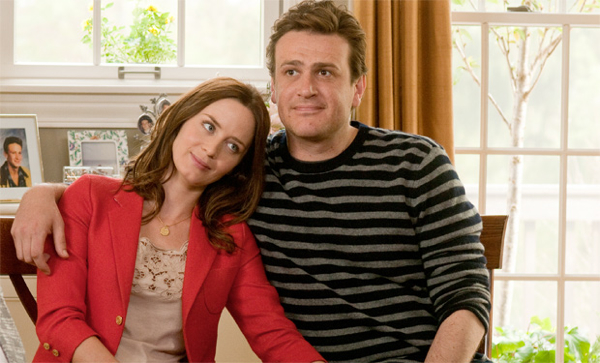Movie review by Greg Carlson
The story of chef Tom (Jason Segel) and academic Violet (Emily Blunt), plays out in “The Five-Year Engagement” with a mixture of novelty and familiarity akin to the plots of countless romantic comedies produced since at least the advent of synchronous sound. Frequent collaborators Segel, who both co-wrote and stars in the movie, and Nicholas Stoller, who co-wrote and directed, play to many of the strengths of the “house style” established by mentor/producer Judd Apatow over the past several years. “The Five-Year Engagement” does not quite conform to the “striver-slacker” construction described by David Denby in his savvy essay published in the July 23, 2007 issue of “The New Yorker,” but it does echo any number of the critic’s ideas concerning the state of the genre.
Denby’s “critic at large” piece, titled “A Fine Romance: The New Comedy of the Sexes” contains within it the observation that the giants of the form, including Capra, La Cava, McCarey, Hawks, Leisen, and Sturges, understood the value and importance of gender equality, and that even though “the man and woman may not enjoy parity of social standing or money… they are equals in spirit, will, and body.” “The Five-Year Engagement” mostly takes this sound advice to heart, bestowing upon its central pair the conflict of Violet’s post-doctoral appointment in Michigan just as Tom’s culinary career looks to blossom in San Francisco. Should they stay or should they go? Either way, someone is going to be resentful.
Tom insists that Violet take the gig, even if it means – for him – trading the promise of running an upscale, fresh seafood kitchen for the grim reality of a no-challenge sandwich shop. The geographical shift quickly develops into an emasculating disappointment, but Tom and Violet are certain that love can conquer all. As built by Segel and Stoller, Tom is the partner whose point of view is slightly more privileged, but the film’s explorations of the practicalities of adulthood and the necessary sacrifices that we may need to make distinguishes it from so many of the farfetched, middlebrow concoctions that pass for modern comedies.
Stoller occasionally struggles to find tonal equilibrium, and Tom’s descent into the bearded, wintry melancholia that anticipates his most passive aggressive choices is far broader than the pointed pillow talk following his faked orgasm and other tough, “grown-up” discussions. The supporting cast is well-stocked with talented players, and Chris Pratt and Alison Brie, who play Tom’s pal and Violet’s sister, are perfect foils whose haphazard and instantaneous bliss arouses deep jealousy in the protagonists (Pratt’s wedding rendition of “Cucurrucucu paloma” is simultaneously hilarious and heartfelt).
One of the most welcome conceptual planks in Segel and Stoller’s script is the upfront announcement that Tom and Violet are already together, in love, and compatible. And while “The Five-Year Engagement” still depends upon a quantity of genre staples (inappropriate engagement party speech, drunken near-infidelities, and as Amanda Dobbins adroitly puts it, “bangs as a symbol of life change”), the filmmakers’ ambition is more “Annie Hall” than anything starring Katherine Heigl after “Knocked Up.” Yes, Tom and Violet will go their separate ways in the “second act breakup” before the inevitable final act reconciliation – this is a romantic comedy, after all – but the details of their journey, compared to so much of the competition, are gladly received.
